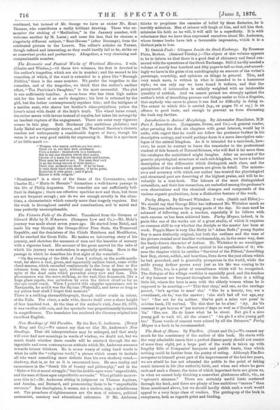Parley Magna. By Edward Whitaker. 2 vols. (Smith and Elder.)—
We should say that George Eliot has influenced Mr. Whitaker much as Mr. Tennyson influences the young poets of the day. No man need be ashamed of following such a teacher, especially if ho follows with such success as has been achieved here. Parley Magna, indeed, is in parts like one of the works out of a great studio, of which it requires no common skill to sly whether the disciple or the master has been at work. Poppie Shaw is very like Hetty in " Adam Bede ;" young Squire Roy is more distinctly original, but both the outlines and the tone of the picture remind us of familiar workmanship, as, in the same way, does- the finely-drawn character of Arthur. Mr. Whitaker is no worshipper of poetical justice. He is almost cynical in his repudiation of it ; wit- ness the chapter which he entitles "Survival of the Fittest," describing how Roy, clever, selfish, and heartless, lives down the just odium which he had provoked, and is generally prosperous in the world, while the- noble young Arthur passes away just as his life was coming to its fruit. This, too, is a point of resemblance which will be recognised. The dialogue of the village worthies is especially good, and the touches of dry humour are frequent throughout the book. Hero is a telling little bit, where the hero is seen with the elderly woman whom he is- supposed to be courting :—" ' Thic ther chap,' said one, as the carriage passed, 'he's agwine to marr' she.' "She be a beauty, too, vor a zweetheart, she be,' was the answer ; she ain't bad off vor ago, any 'ow.' 'Nor eot for tin neither. She've putt a mine yew pun' in zciivins bank, I'll waernd. 'Tis thic ther he be a'ter." Ay. An 'tis zummat to get beacon w"yer teaturs o' days zo well as o' Zundays, that 'tie.' Ees, ees. He do knew what he be about. But gio I a nice young gell to walk wi', all the zaame l' An gio I a nice young gell too.' Those words of consent were echoed by all the listeners." Parley Magna is a book to be recommended.






























 Previous page
Previous page